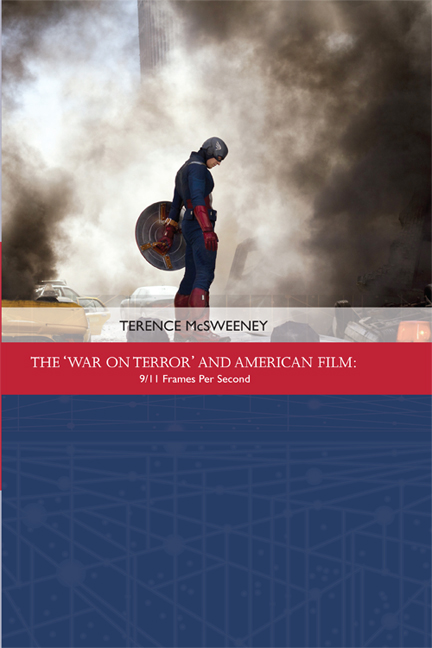Book contents
- Frontmatter
- Contents
- List of Illustrations
- Acknowledgements
- Introduction
- 1 The Lives of Others: Vulnerability in Post-9/ 11 American Cinema
- 2 Boots on the Ground: The New Millennial Combat Film as Cultural Artefact
- 3 ‘Masters of our own Security’: Redemption through Violence in the Post-9/ 11 Action Genre
- 4 Turning to the Dark Side: Challenging American Mythology in the Superhero Genre
- 5 Remaking 9/11: Imagining the Unimaginable in the Alien- invasion Film
- 6 Decade of the Dead: Zombie Films as Allegory of National Trauma
- 7 The Rise and Fall of Empires: The ‘War on Terror’ as Allegorical Moment in Historical Film
- Conclusion
- Bibliography
- Select Filmography
- Index
3 - ‘Masters of our own Security’: Redemption through Violence in the Post-9/ 11 Action Genre
Published online by Cambridge University Press: 05 August 2016
- Frontmatter
- Contents
- List of Illustrations
- Acknowledgements
- Introduction
- 1 The Lives of Others: Vulnerability in Post-9/ 11 American Cinema
- 2 Boots on the Ground: The New Millennial Combat Film as Cultural Artefact
- 3 ‘Masters of our own Security’: Redemption through Violence in the Post-9/ 11 Action Genre
- 4 Turning to the Dark Side: Challenging American Mythology in the Superhero Genre
- 5 Remaking 9/11: Imagining the Unimaginable in the Alien- invasion Film
- 6 Decade of the Dead: Zombie Films as Allegory of National Trauma
- 7 The Rise and Fall of Empires: The ‘War on Terror’ as Allegorical Moment in Historical Film
- Conclusion
- Bibliography
- Select Filmography
- Index
Summary
The intrusions of September 11 broke the dead bolt on our protective myth, the illusion that we are masters of our own security, that our might makes our homeland impregnable, that our families are safe in the bower of our communities and our women and children are safe in the arms of their men.
Susan Faludi, The Terror Dream: Fear and Fantasy in Post 9/11 AmericaWe must take the battle to the enemy, disrupt his plans, and confront the worst threats before they emerge. In the world we have entered the only path to safety is the path of action. And this nation will act.
George W. Bush (2002b)In the wake of the terrorist attacks on 11 September 2001 it was widely speculated that film genres built on excessive and gratuitous violence would become redundant, rejected by audiences who had no further desire to receive vicarious thrills from entertainment that continued to glamorise brutality or trivialise the loss of human life. Yet the decade that followed revealed this to be only partially true, as American cinema refused to forgo depictions of violence. Rather than eschewing 9/11 and the subsequent war on terror, the action genre subsumed the prevalent fears and anxieties of the new millennium into its narratives, which manifested themselves primarily as threats to the nation and the family, the erosion of traditional forms of masculinity and patriarchy, and the traumatic effects of violence not just on the victims, but also its perpetrators. This chapter attempts to ascertain how far the action genre incorporated the discourse of the war on terror into its narratives. Certainly not all of the films of the genre are explicitly connected to 9/11 and the war on terror (although a great many are), but emerging post-9/ 11 debates on masculinity, the legitimacy of revenge and America's role in international affairs provide context for the genre just as the aftermath of the Vietnam War had served as a framework for action cinema twenty years before. As Susan Jeffords and many others have observed, the defining action films of the 1980s, starring the likes of Sylvester Stallone, Arnold Schwarzenegger and Chuck Norris, can be persuasively seen as an articulation of and an engagement with Reaganite political philosophies and muscular representations of American power.
- Type
- Chapter
- Information
- The 'War on Terror' and American Film9/11 Frames Per Second, pp. 81 - 110Publisher: Edinburgh University PressPrint publication year: 2014



